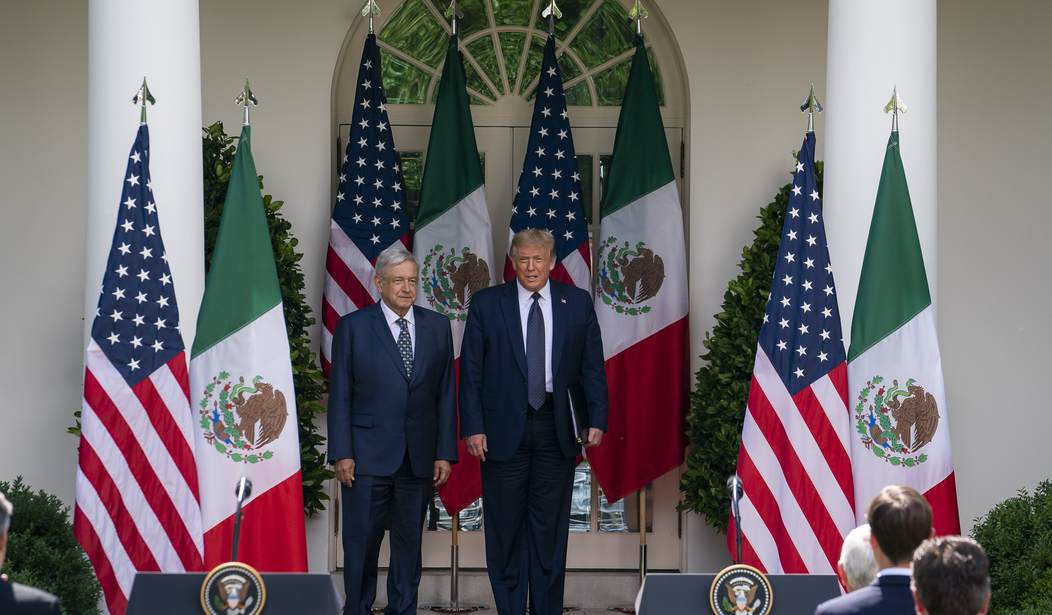The promising U.S.-Mexico-Canada Agreement (USMCA) which entered into force on July 1st, needs the full commitment of Mexican President Andres Manuel Lopez Obrador for it to work. The problem is Lopez-Obrador, or AMLO as he is known, continues to align with those in Latin America opposed to free enterprise and embraces some policies that reflect the same.
The United States and Mexico share a $614 billion trade relationship. Indeed, Mexico became America’s number one trade partner in February of this year, surpassing China and Canada for the first time.
The contents of that trade matter for national security. Nearly all top ten U.S. imports from Mexico have a primary use or dual use in areas of critical infrastructure. Material used in cyber, transportation, and energy all arrive via U.S. trade with Mexico.
It is not a stretch to say that Mexico is now the most important partner in terms of economy and security for the United States. All the more concerning then are AMLO’s external relationships and foreign policy.
The AMLO government has repeatedly sided with autocratic regimes, like Cuba and Russia, by rejecting international requests to shun Venezuela’s Nicolás Maduro. AMLO has also “spurned” a regional and global consensus against the Maduro regime using the veneer of non-interference to justify its position, despite those close to the president having openly expressed support for the Venezuelan regime.
Meanwhile, farther south, Argentina’s progressive head of state President Alberto Fernandez used his first foreign visit as president-elect in November 2019 to meet with AMLO. President Fernandez then flew back to Buenos Aires to lead a coalition meeting of progressive, populist political leaders in Latin America, known as Grupo Puebla. President Fernandez remains one of the most vocal supporters of the Maduro regime in Venezuela.
Recommended
President Fernandez in early 2020 also called for the revival of the Community of Latin American and Caribbean States (CELAC) – a regional bloc established in 2010 by the late Hugo Chavez of Venezuela and once led by Cuba’s Raul Castro. CELAC is designed to counter the Organization of American States (OAS) and the United States. Mexico will now lead CELAC in 2021.
It should come as no surprise that Nicolas Maduro praised both AMLO and Alberto Fernandez during a speech in Cuba as the new progressives of Latin America.
Equally problematic are policies that discourage private enterprise. Mexican state oil giant Pemex continues to claim ownership over the majority of an offshore deposit in the Gulf of Mexico discovered and managed by a private consortium of investors, led by Talos Energy out of Houston. One senior executive at a private international power company recently stated, “There’s a very strong ideological vision—they [AMLO administration] want government control to use energy as a lever of development.” This sentiment is causing concern throughout the private sector in Mexico.
Worse still, Mexican oil companies with little or no track record in the oil market have been found delivering oil to Venezuela, some through foreign ports, to avoid U.S. sanctions. It remains a mystery how previously unknown oil companies have been able to access such significant amounts of oil in Mexico.
AMLO routinely downplays autocrats’ praise and responds to questions about government centralization with bland talking points. We know that organizations, such as CELAC, are being used as vehicles to promote state-control over local economies. They are also being used as a gateway for China to increase its political and economic footprint in the region. We can only hope that AMLO’s affinity for socialist ideas and cozy relationships with Latin America’s more populist and autocratic regimes will not spoil the USMCA. America’s economic and national security, and the Texas business community, depend on it.
David Grantham is a Senior Fellow for the Center for a Secure Free Society (SFS) and author of the book Consequences: An Intelligence Officer’s War. His website is granthamstrategies.com. Excerpts of this article were taken from the most recent Transregional Threats Journal of SFS.

























Join the conversation as a VIP Member